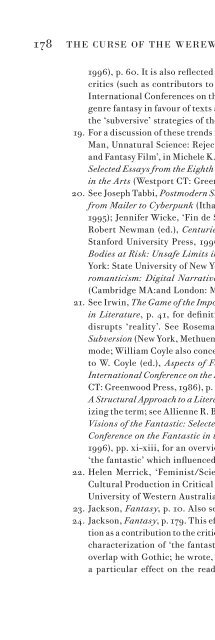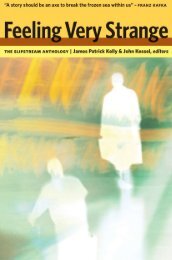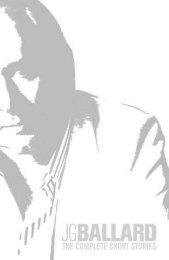The Curse of the Wer.. - Site de Thomas - Free
The Curse of the Wer.. - Site de Thomas - Free
The Curse of the Wer.. - Site de Thomas - Free
Create successful ePaper yourself
Turn your PDF publications into a flip-book with our unique Google optimized e-Paper software.
178 THE CURSE OF THE WEREWOLF<br />
1996), p. 60. It is also reflected in a predisposition among postmo<strong>de</strong>rnist<br />
critics (such as contributors to <strong>the</strong> collections <strong>of</strong> essays drawn from <strong>the</strong><br />
International Conferences on <strong>the</strong> Fantastic in <strong>the</strong> Arts) to ignore popular<br />
genre fantasy in favour <strong>of</strong> texts and <strong>the</strong>oretical perspectives expressive <strong>of</strong><br />
<strong>the</strong> ‘subversive’ strategies <strong>of</strong> <strong>the</strong> (literary) fantastic.<br />
19. For a discussion <strong>of</strong> <strong>the</strong>se trends in fantasy see Lisa M. Heilbronn, ‘Natural<br />
Man, Unnatural Science: Rejection <strong>of</strong> Science in Recent Science Fiction<br />
and Fantasy Film’, in Michele K. Langford (ed.), Contours <strong>of</strong> <strong>the</strong> Fantastic:<br />
Selected Essays from <strong>the</strong> Eighth International Conference on <strong>the</strong> Fantastic<br />
in <strong>the</strong> Arts (Westport CT: Greenwood Press, 1990), pp. 113–19.<br />
20. See Joseph Tabbi, Postmo<strong>de</strong>rn Sublime: Technology and American Writing<br />
from Mailer to Cyberpunk (Ithaca and London: Cornell University Press,<br />
1995); Jennifer Wicke, ‘Fin <strong>de</strong> Siècle and <strong>the</strong> Technological Sublime’, in<br />
Robert Newman (ed.), Centuries’ Ends, Narrative Means (Stanford CA:<br />
Stanford University Press, 1996), pp. 302–15; Robert Burns Neveldine,<br />
Bodies at Risk: Unsafe Limits in Romanticism and Postmo<strong>de</strong>rnism (New<br />
York: State University <strong>of</strong> New York Press, 1998); Richard Coyne, Technoromanticism:<br />
Digital Narrative, Holism, and <strong>the</strong> Romance <strong>of</strong> <strong>the</strong> Real<br />
(Cambridge MA:and London: MIT Press, 1999).<br />
21. See Irwin, <strong>The</strong> Game <strong>of</strong> <strong>the</strong> Impossible, pp. 8–9, and Rabkin, <strong>The</strong> Fantastic<br />
in Literature, p. 41, for <strong>de</strong>finitions <strong>of</strong> ‘<strong>the</strong> fantastic’ as an element that<br />
disrupts ‘reality’. See Rosemary Jackson’s Fantasy: <strong>The</strong> Literature <strong>of</strong><br />
Subversion (New York, Methuen, 1981) for a discussion <strong>of</strong> <strong>the</strong> fantastic as a<br />
mo<strong>de</strong>; William Coyle also conceptualized it as a mo<strong>de</strong> in his introduction<br />
to W. Coyle (ed.), Aspects <strong>of</strong> Fantasy: Selected Essays from <strong>the</strong> Second<br />
International Conference on <strong>the</strong> Fantastic in Literature and Film (Westport<br />
CT: Greenwood Press, 1986), p. 2. Tzvetan Todorov’s study <strong>The</strong> Fantastic:<br />
A Structural Approach to a Literary Genre (1973) was influential in popularizing<br />
<strong>the</strong> term; see Allienne R. Becker, ‘Introduction’ in A.R. Becker (ed.),<br />
Visions <strong>of</strong> <strong>the</strong> Fantastic: Selected Essays from <strong>the</strong> Fifteenth International<br />
Conference on <strong>the</strong> Fantastic in <strong>the</strong> Arts (Westport CT: Greenwood Press,<br />
1996), pp. xi–xiii, for an overview <strong>of</strong> <strong>the</strong> French tradition <strong>of</strong> inquiry into<br />
‘<strong>the</strong> fantastic’ which influenced Todorov.<br />
22. Helen Merrick, ‘Feminist/Science/Fictions: A Case Study <strong>of</strong> Feminist<br />
Cultural Production in Critical and Popular Communities’, Ph.D. <strong>The</strong>sis,<br />
University <strong>of</strong> Western Australia, 1998, p. 92.<br />
23. Jackson, Fantasy, p. 10. Also see Armitt, <strong>The</strong>orising <strong>the</strong> Fantastic, p. 3.<br />
24. Jackson, Fantasy, p. 179. This effect is compoun<strong>de</strong>d by her study’s orientation<br />
as a contribution to <strong>the</strong> critical tradition established by Todorov, whose<br />
characterization <strong>of</strong> ‘<strong>the</strong> fantastic’ also evinced a consi<strong>de</strong>rable <strong>de</strong>gree <strong>of</strong><br />
overlap with Gothic; he wrote, for example, that ‘<strong>the</strong> fantastic produces<br />
a particular effect on <strong>the</strong> rea<strong>de</strong>r — fear, or horror, or simply curiosity





